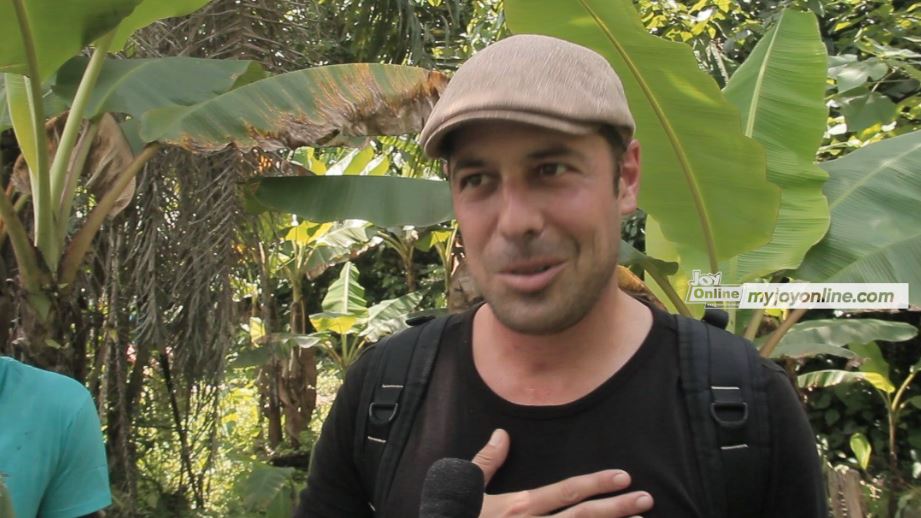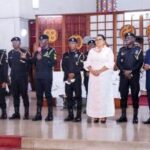Ghanaians have been urged to develop the habit of protecting forests as carbon sinks.
According to scientists, forests absorb more carbon from the atmosphere than they emit and carbon sequestration occurs when carbon is deposited in forest biomass (trunks, branches, roots, and leaves), dead organic matter (litter and dead wood), and soils.
Conservation, according to the Swiss-based environmental activist, is one of the most important ways to combat climate change and other environmental challenges in the country.
Olivier Hasinger spoke to the media after visiting Akotaa, a small community in the Atwima Mponua District of the Ashanti Region, with the Institute of Nature and Environmental Conservation (INEC) and the Forestry Research Institute of Ghana (FORIG) to monitor the extent of growth of some African teak tree species planted about two years ago.
The project, undertaken in collaboration with the Forestry Commission (FC), the Forestry Research Institute of Ghana (FORIG), and the Kwame Nkrumah University of Science and Technology (KNUST), aimed to save some species, locally known as ‘Krokodua,’ from extinction in the country’s forests.

The Fondation Franklinia-funded initiative saw the planting of approximately 100,000 seedlings of African teak species in the Asenanyo Forest Reserve.
According to Olivier, who works for the Swiss-based Fondation Franklinia, forests store a significant amount of carbon, which will greatly aid in the fight against climate change and other environmental issues.
He believed that planting more trees around the world will help to make the planet a better place for human life and biodiversity.
“Trees are absolutely key species in the ecosystem [because] they provide habitat for all the biodiversity that depends on them, and it provides lots of ecosystem services for the people,” he said.
According to him, “if you have a healthy forest with diverse trees, it will be resilient to climate change, and it can also provide clean water, which is absolutely needed for everyone who lives around.”
Olivier also stated that the Fondation Franklinia will continue to support the conservation of endangered species in the country, specifically Pericopsis elata and other threatened trees.
He also stated that plans are being developed to assist additional organizations in Ghana in protecting forests and other critical habitats that provide important ecosystem services to the people.
“Our plan is to continue to support those projects because threatened tree conservation requires long-term efforts and also follow-up, post-planting care and maintenance, which INEC is doing, and we’re very pleased about that.”
Mr. David Kwarteng, Director of INEC, stated that it is critical to conserve and protect endangered species such as Pericopsis elata and others from extinction because of the benefits they provide to communities.
While watching a two-year implantation of the species at the Asenanyo Forest Reserve, he stated that the step was aimed at planting more of the species to give them a fighting chance of survival in the long run.
Mr. Kwarteng stated that a variety of measures, including weed management and beating up, have been implemented to ensure that the trees are maintained and protected.
“We set out about two and half years ago and like you see this is doing amazingly well it’s because we’ve taken conscious efforts to ensure that we don’t just plant the trees we take actionable steps to ensure that the trees that are planted are maintained, so we do what we call weed management, we also do what we call beating up, of course not every seedling that you put on the soil will survive in the long-term so the ones that are not able to survive we come back and then we replant.”
He stated that human activities such as felling of indigenous trees such as Milicia excelsa (Odum) and Triplochiton scleroxylon (Wawa) are frowned upon, but steps are being taken in collaboration with the Forestry Commission to stem the tide.
The community’s Chief, Nana Amoako Gyampah, urged residents to take tree planting seriously in order to protect the environment and ensure prosperity.
He also warned them about activities that endanger the survival of trees and forests, such as bushfires, deforestation, and illegal mining known as ‘galamsey’.
Some forest guardians expressed gratitude to INEC and its partners for bringing the project to the community.
According to them, the project is assisting them in conserving the environment while also earning money to support themselves and their families.
They asked the organizations to provide them with additional logistics such as Wellington boots, raincoats, and cutlasses to aid in the effective maintenance of the forest.
Meanwhile, INEC has trained community members in snail, mushroom, grass cutter, and beekeeping farming as an alternative source of income.





